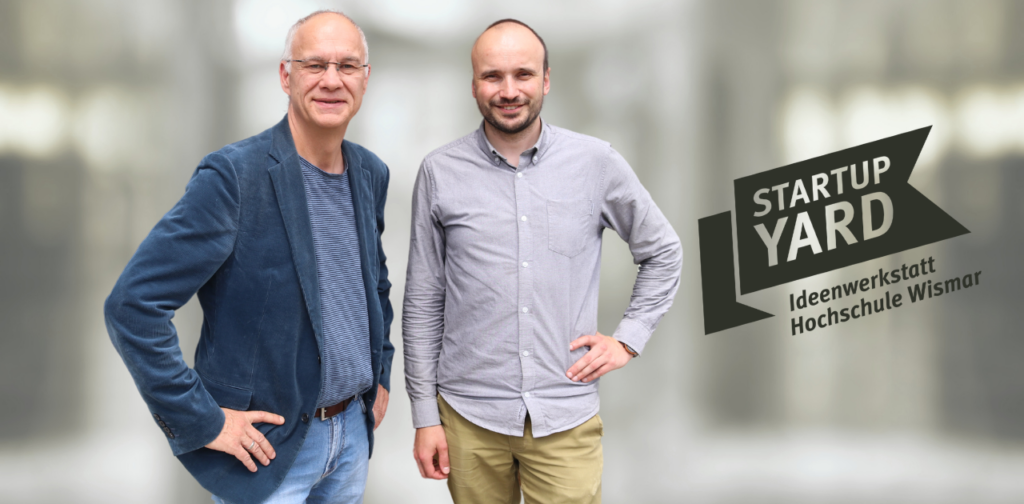Prof. Dr Olaf Streuer has been Professor of General Business Administration at Wismar University of Applied Sciences since 2015 and has headed the Master's degree programme in Entrepreneurship since 2024.
From the development of innovative business ideas to their implementation and the sustainable management of a company - the Entrepreneurship degree programme prepares students for the challenges and opportunities of entrepreneurship.
Prof. Dr Streuer, what inspired you to create the Entrepreneurship study programme? Who is the programme aimed at?
The Entrepreneurship degree programme at Wismar University of Applied Sciences is very application-oriented, individual and offers students many facets. When I discovered the StartupYard at the university, I knew that this could become the home of the degree programme.
The Entrepreneurship degree programme is aimed at students from all disciplines who want to develop and implement their own business idea. So we offer a practice-orientated education that covers both business fundamentals and specific knowledge in the field of business start-ups.
Our students learn how to develop business models, plan financing strategies and implement marketing concepts. The programme was launched in the summer semester of 2024 and four of the more than 20 students who applied actually enrolled. The programme is designed for ten to a maximum of 15 students. This allows us to respond directly to each individual and provide personalised support. If there were too many participants, the individuality would be lost.
That sounds very exciting. What are the special features of the study programme?
What makes the programme special is its application orientation. Students put the knowledge they have learnt directly into practice in their entrepreneurial project. As a rule, this is their own start-up project. However, students may also want to take over a family business, for example. We open up the entire entrepreneurial network that the region has to offer to students for support and to share experiences. Contacts to regional companies and start-ups combined with a mentoring programme and regular workshops and networking events. Such as those organised at the university's StartUpYard, the InnovationPort in Wismar or elsewhere in MV, for example by the Gründungswerft.
‘The Entrepreneurship study programme is very application-oriented and individual. That makes it unique.’
– Prof. Dr Olaf Streuer, Head of the Entrepreneurship degree programme
What role does the StartupYard play in the degree programme?
The StartUpYard plays a central role in the degree programme. It is an open workspace for students from all faculties and staff. The courses take place in a multifunctional room. And in the StartUpYard workshop, they can use all the tools, from crafts to digital printing, to develop, test and refine prototypes of their product ideas and make them ready for the market. This means that what we teach in theory can be immediately put into practice and turned into business ideas.
In addition, there are the aforementioned opportunities to exchange ideas with other students, founders and network partners at events. Or simply over a cup of coffee at the meeting launch. There is always something going on in the Yard and everyone enjoys good contacts, interdisciplinary dialogue and inspiring new ideas.
All of this enables them to gain valuable practical experience and build a network that will benefit them after graduation. It is therefore not only an enrichment of the curriculum, but also a springboard into entrepreneurial practice.

What does the curriculum look like? What skills do students acquire during the course of the programme?
The degree programme is divided into three semesters. The core of the programme covers the essential elements of the start-up process. From the development of business ideas, business models and the marketing concept in the first semester to business structures and processes, financing, recruiting and leadership as well as the legal issues of founding a company in the second semester to the development of the business plan and preparation for pitches in the third semester, which concludes with the Master's thesis.
We also offer a broad catalogue of elective modules from various disciplines, including other degree programmes and faculties. Students can choose to specialise in areas such as design thinking, negotiation, prototyping, digitalisation of processes, products and marketing, sustainability management, communication design and media and much more, depending on their skills profile and business model.
Our students thus acquire interdisciplinary thinking. Overall, it is a completely different intrinsic motivation to work on your own professional history and realise your own ideas.
What career opportunities are open to graduates of the Entrepreneurship study programme?
Our graduates are ideally equipped to set up their own companies or take on management positions in start-ups and established companies, e.g. as potential successors. They are also able to take on management positions in existing companies or work as consultants. Essentially, the Entrepreneurship degree programme teaches management skills that open up a wide range of employment opportunities in all kinds of sectors.
How does the study programme prepare students for the challenges and opportunities of company succession?
The topic of succession is an important future issue in the field of entrepreneurship. Because many existing companies are facing the challenge of transferring their management to the next generation in the coming years. A well thought-out succession concept can ensure the continued existence and further development of the company and offers immense opportunities for young, innovative minds who grow into these roles.
The Entrepreneurship degree programme teaches students all the management skills they need for this. Even if our students are primarily motivated to develop their own business project, it cannot be ruled out that they will take on a business succession if the opportunity arises. In this case, the most important thing is the matching between the current entrepreneur and the successor. In any case, this opens up further career prospects for students with the opportunity to contribute their ideas and entrepreneurial commitment to established companies.
What significance does the study programme have for economic development in MV?
With the Master's degree programme in Entrepreneurship, we can make a significant contribution to promoting start-ups and entrepreneurship in Mecklenburg-Vorpommern. In view of the demographic development in our federal state, it is so important to offer young people attractive prospects and promote their involvement in the region.
That is why one of the main aims of this degree programme is to attract committed young talent from the region and for the region. Those who decide to study entrepreneurship often already have exciting ideas. They are particularly motivated and very open to networking and exchange in the region. This offers great potential for fresh perspectives from which established companies and the entire regional economy can also benefit.
‘The study programme is linked to the hope that the young talent will stay in their home country or in MV.’
– Prof. Dr Olaf Streuer, Head of the Entrepreneurship degree programme
How do you support students in establishing and maintaining networks?
Networking is a central element of the degree programme. Networking is essential because it's often not just what you know, but who you know. Connections to other entrepreneurs, investors, mentors and even fellow students can open doors that would remain closed with pure knowledge alone.
Specifically, our interdisciplinary range of elective modules ensures that our entrepreneurs work on joint projects with students from other degree programmes and faculties, e.g. prospective interior designers, product designers, business informatics specialists, engineers, etc.
The mentoring programme that we have initiated for the degree programme offers exclusive access to the start-up community. Experienced founders or entrepreneurs from the region accompany entrepreneurship students as mentors for the entire duration of the programme. Students also have access to the entire entrepreneurial network with events, workshops and projects that we have established at Wismar University of Applied Sciences for many years via the Robert Schmidt Institute, the StartUpYard and the InnovationPort.
What advice would you give to future students who want to pursue a career in entrepreneurship?
To be courageous and open to new things. Entrepreneurship requires perseverance and a willingness to take risks. But it also offers the opportunity to realise your own ideas and change the world a little. Use your time at the university to network, try things out and learn from the experiences of others.
Interested parties can apply for the summer semester 2025 from 1 December 2024 to 15 January 2025. A first professionally qualifying degree is required for admission.
Further information on the study programme can be found here.
Text/Photos: V. Teske-Mbalisike



